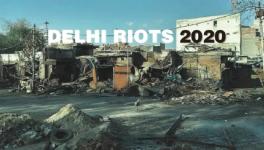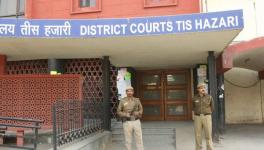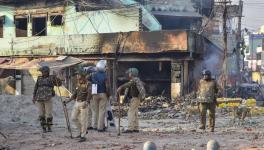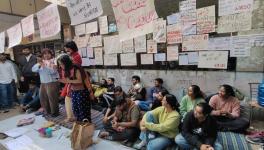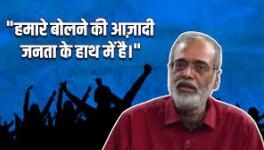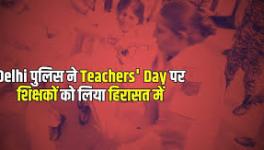With Delhi Violence Cases Caving in, Who Will Fix Police Accountability for Lying on Oath?
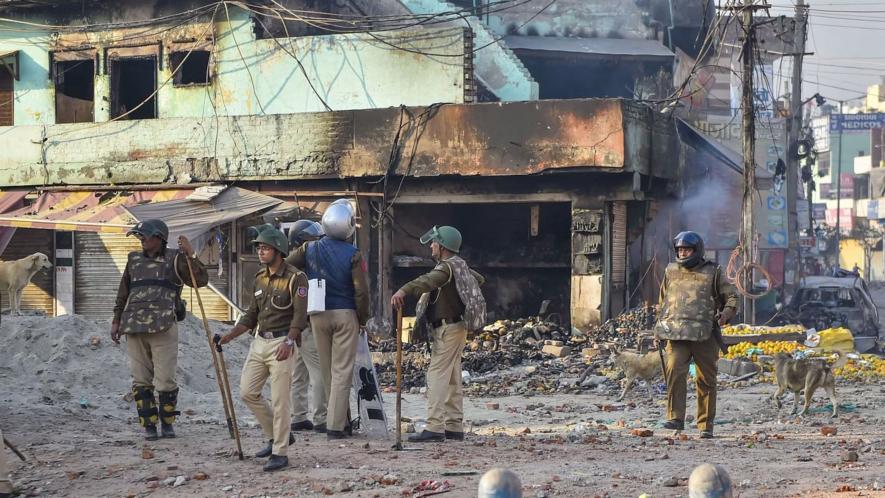
A neighbourhood vandalised in northeast Delhi during the 2020 riots. Image Courtesy: PTI
New Delhi: As several cases related to the 2020 Northeast Delhi communal violence collapse in courts like a pack of cards and judges pull up the investigating agency for fabricating evidence, no question is being raised on the accountability of the law enforcers (Delhi Police) — forget about facing consequences.
The Trans Yamuna region of the national capital (Northeast Delhi) had witnessed a bloody communal violence following a nationwide protest against the Citizenship (Amendment) Act, which claimed 53 lives and left hundreds injured. Majority of those killed were Muslims.
Three years after the worst communal violence in the national capital since Partition, courts in the city have continued to come down heavily on the police — making stinging remarks on the shabby investigation and booking mostly Muslims for the violence that took place in February 2020, on the basis of concocted evidence.
A SAGA OF CONCOCTION, FABRICATION
On August 16, Additional Sessions Judge (ASJ) Pulastya Pramachala at Karkardooma Court discharged three men — Aqeel Ahmed alias Papad, Rayees Khan and Irshad — in a case related to the violence as the judge suspected that the investigating officer had “falsified and manipulated the evidence” and charge sheeted the accused in a “predetermined, mechanical and erroneous manner, with subsequent actions to only cover up the initial wrong actions”.
The court ordered, “... instead of having grave suspicion against accused persons for their involvement in the alleged incidents, I am having suspicion for IO (investigating officer) having manipulated the evidence in the case, without actually investigating the reported incidents properly.”
On August 24, ASJ Pramachala acquitted a Muslim man who was an accused in a case related to the violence, describing the police statement against him as “artificial”. Also in this order, the court concluded that the police had filed its chargesheet in a “mechanical manner without actually investigating the incidents properly”.
On August 28, the same judge accused the Delhi Police of “befooling” the court by relying on a video for evidence when such a video did not exist, “stalling” the trial and adopting “double standards” in two cases.
Acquitting Noor Mohammed, a resident of Sonia Vihar, on May 30, Metropolitan Magistrate Shirish Aggarwal had said that it appeared that the statement of a prosecution witness (a head constable) was “procured and prepared falsely and belatedly to solve this case.… The police was already aware that its case was fabricated…”.
The above mentioned orders are a few sample of a string of judgments in cases related to the violence, faulting the Delhi Police for planting false evidence and carrying out shabby probes.
Let’s revisit some more cases in which the court discharged or acquitted or gave bail to those accused of violence.
On September 20, 2022, ASJ Pramachala acquitted Noor in another case, observing that his identification as an accused was “probably an outcome of an afterthought development” by the police.
The acquittal was also based on the contradictory statements of the investigation officer.
In the same month, the court also acquitted Mohammad Shoaib, Shahrukh, Rashid and Mohammad Shahnawaz in a case. The court, while acquitting the said accused, found that the sole testimony of the constable (prosecution witness), who said that he had seen the accused in the crowd, was not found sufficient to admit their presence in the crowd.
Read Also: Delhi Violence: Police Books People Using Same Narrative, Different FIRs
Another contradictory statement by an assistant sub-inspector and a head constable prompted Additional Sessions Judge Vinod Yadav to observe in October 2021 that the “police witnesses are lying on oath”.
The head constable had claimed before the judge that he had identified three of the four rioters as Rinku Subziwala, Golu Kashyap and Vikas Kashyap. He had said that he knew the three men as he had been deployed in the area as a beat constable since 2019.
However, another prosecution witness, the assistant sub-inspector, on the contrary, told the court that the three accused — despite being named by the head constable — could not be identified during the investigation.
The judge then noted, “... there is no material on record that efforts were made by the IO to apprehend the said accused persons. Prima facie, one of the police witnesses is lying on oath (that is) punishable under section 193 of the IPC.”
“This is a very sorry state of affairs,” Yadav had said, seeking a report in that regard from the deputy commissioner of police (Northeast Delhi).
Read Also: Delhi Riots: Bail Orders Narrate a Saga of ‘Doubtful’ Witnesses, ‘Concocted’ Evidence
In September 2021, ASJ Yadav, while discharging three men, including Shah Alam, brother of former Aam Aadmi Party councillor Tahir Hussain, who were accused of rioting, arson and various offences, had pulled up Delhi Police for measurably failing to conduct a proper investigation.
The judge observed in his order that the police “made no effort” to investigate the case and were “merely filing chargesheets without any real effort being made to trace out the eye witnesses, real accused persons and technical evidence”.
Observing that the “investigating agency has merely tried to pull the wool over the court’s eyes” and expressing suspicion that a constable — a witness in the case — had been “planted”, the court had said, “I am not able to restrain myself from observing that when history looks back at the worst communal riots since partition in Delhi, it is the failure of the investigating agency to conduct proper investigation by using the latest scientific methods, that will surely torment the sentinels of democracy.”
However, months later, the judge, who had passed several orders against the flawed investigation, was transferred.
NewsClick analysed the judgments passed by courts in Delhi adjudicating on matters relating to the riots between 2020 till date. In over 10 orders, the courts have raised serious doubts on the credibility of witness statements. In most of the cases, the prosecution witnesses were police personnel.
In some cases, the statements of the prosecution witnesses were identical — raising doubts about their veracity. The analysis of the orders revealed some of the witnesses had alleged that they were coerced into giving false statements by the police.
In addition to lower courts, higher judiciary too criticised the Delhi Police for its lackadaisical approach in investigating the riots cases.
In October 2020, the Delhi High Court granted bail to one Irshad Ahmad on the grounds that the two police “witnesses seemed to be planted”.
There are several other orders (this and this for an instance) passed by the High Court over the past three years that have strictures against the investigators.
While making scathing remarks against police functioning and prosecution in the cases, the trial court attempted to ameliorate the situation by referring individual cases to senior officers i.e. the concerned DCP and in some cases the Commissioner of Police.
However, these referrals were made with highly critical comments without any action against the erring officer or similar measures to ensure his accountability.
What the courts are calling a “sad and shocking situation”, the judicial orders have consistently reflected a similar tone. But the directions are falling on deaf ears.
IS PRODUCING FALSE EVIDENCE A CRIME?
Fabricating and using false evidence, falsely charging someone with an offence and making false claims in courts are criminal offence against public justice, as per the provisions of Chapter XI of the Indian Penal Code.
And the punishment for the offence, depending its severity, varies between a jail term of three years to life imprisonment and even death penalty.
However, despite the Delhi Police being found by different courts indulging in fabricating evidence, there is no accountability of its officers.
WHY SO?
Despite acknowledging perjury on part of the investigators, the judiciary finds itself helpless to prosecute erring police officials who often lie under oath.
The Code of Criminal Procedure for prosecution of offences under Chapter XI of the IPC is extremely complicated.
In case of a complaint for such an offence, preliminary inquiries have to be instituted by a court to ascertain whether the complaint is merited.
In addition, the trial of such offences is to be conducted separately from the main trial wherein the alleged false evidence was produced.
It’s not easy for courts to prosecute every case of alleged fabrication and concoction as it would have no time for other matters as Indian judicial system is flooded with such cases.
Even though the courts have acquitted innocent persons, strict action is needed against guilty police for carrying out unfair and serious lapses in investigations, failure to apprehend and bring the real culprits to book and framing of innocents using fake evidence.
Get the latest reports & analysis with people's perspective on Protests, movements & deep analytical videos, discussions of the current affairs in your Telegram app. Subscribe to NewsClick's Telegram channel & get Real-Time updates on stories, as they get published on our website.










